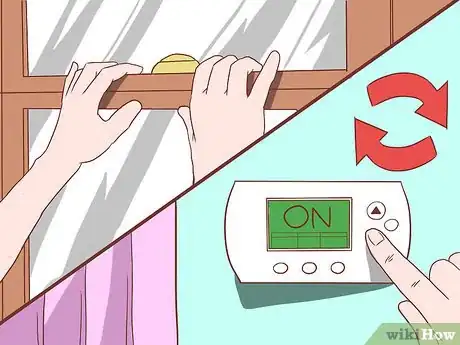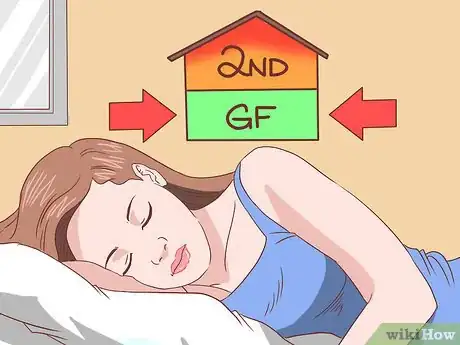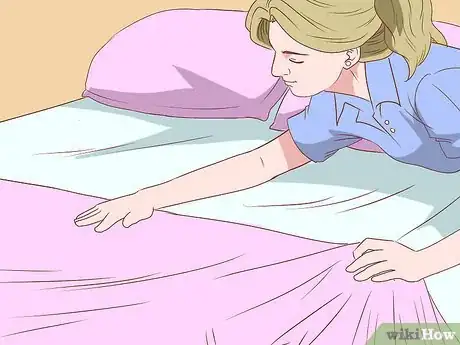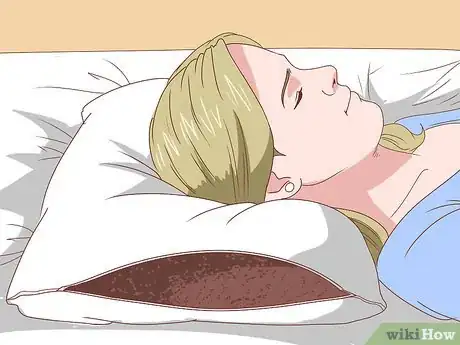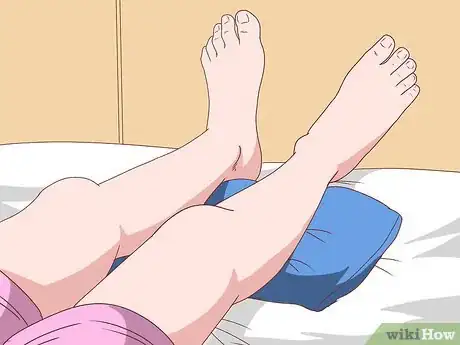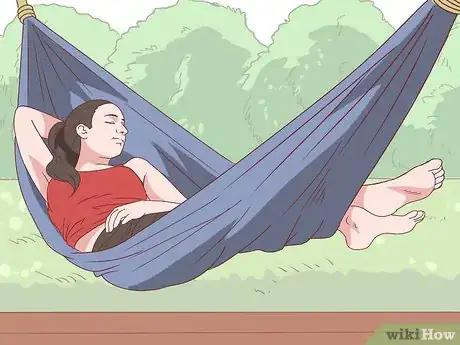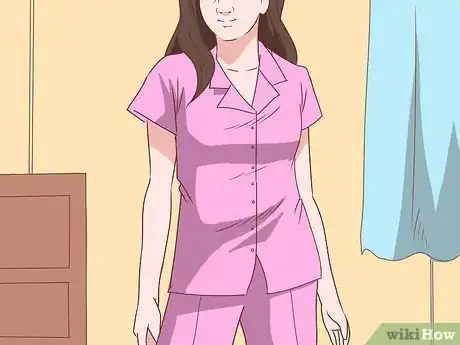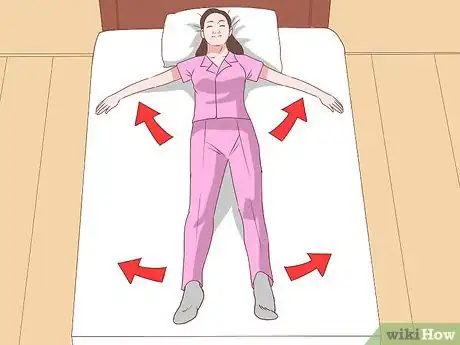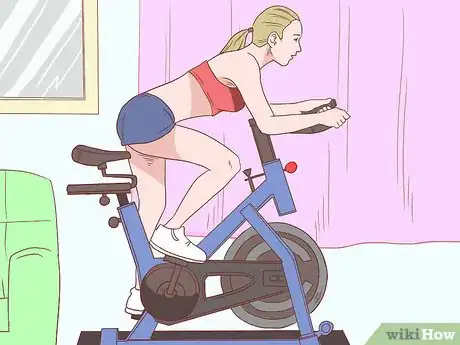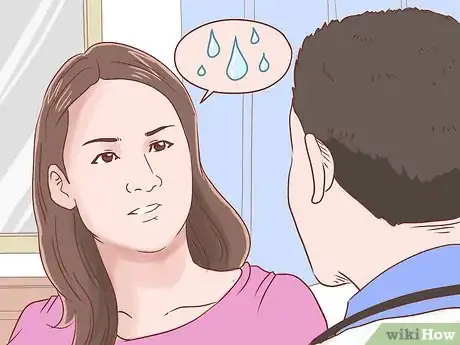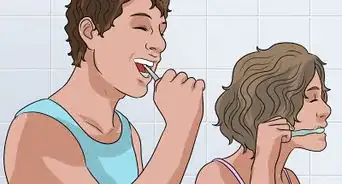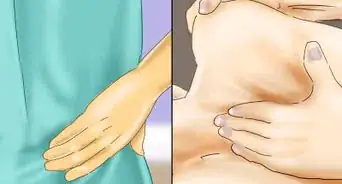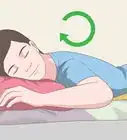This article was co-authored by Alex Dimitriu, MD. Alex Dimitriu, MD is the Owner of Menlo Park Psychiatry and Sleep Medicine, a clinic based in the San Francisco Bay Area with expertise in psychiatry, sleep, and transformational therapy. Alex earned his Doctor of Medicine from Stony Brook University in 2005 and graduated from the Stanford University School of Medicine's Sleep Medicine Residency Program in 2010. Professionally, Alex has dual board certification in psychiatry and sleep medicine.
There are 14 references cited in this article, which can be found at the bottom of the page.
This article has been viewed 347,801 times.
Getting a good night's sleep is integral to your productivity and well being. Overheating while you sleep is a common problem, and one that can cause restlessness or sleep loss. If you follow a few tricks and tips, you can stay cool while you sleep and get a better night's rest.
Steps
Cooling the Room
-
1Use air conditioning. The simplest way to keep your room cool while you sleep is to use your air conditioner if you have one. Central air or a portable window unit will both do the trick. The ideal sleeping temperature for most people is between 60 and 70 °F (16 and 21 °C).[1]
- Most people naturally prefer it a little cooler at night. Even if you like to keep your home warm during the day, adjust the temperature at night to make it a little cooler.[2]
- If you have a programmable thermostat, don't forget to set it so that it automatically adjusts to a warmer temperature just before you wake up in the morning.
-
2Use fans. If you don't have air conditioning, a fan is the next best option. You can use a fan to increase circulation, create a cross breeze, and pull hot air away from you.[3]
- If you have a ceiling fan, set it so that the blades are turning counter-clockwise. This should help pull the hot air up towards the ceiling and away from your bed.
- If it's cooler outside than it is in your room, try putting a box fan in an open window facing outside.
- Multiple fans can be used to create a nice cross breeze in your room, especially if you have two windows on opposite walls.
- You can also try creating an old school air conditioner by placing a large block of ice or pile of ice cubes in front of a fan. Just make sure to use a large enough bowl or pan so that the water has somewhere to go when the ice melts!
Advertisement -
3Keep the sun out. On really hot days, keep your bedroom cool by keeping your blinds closed all day. You will have to deal with a dark room, but it will be much cooler when it's time for bed.[4]
- Thermal blinds or shades might be a good investment if the sun makes your room unbearably hot in the summer. They will also help prevent drafts in the winter.
- If you own your home, you might want to consider planting trees near your bedroom windows to give yourself some shade.
-
4Sleep downstairs. Heat rises, which means that the second floor of your home will typically be warmer than the first floor. If you live in a two story house and you can't get your second-floor bedroom cool enough on hot nights, consider setting up a temporary sleeping area on the main level.[5]
Making Your Bed More Comfortable
-
1Adjust your covers. If you use the same quilt or comforter year-round, you might need to reevaluate. If you find yourself waking up hot when you sleep, your covers may be too heavy and trap heat in your bed. [6]
-
2Change your sheets. Fabrics like flannel and satin don't breath and can trap heat in the bed with you, causing you to overheat. Switch out these materials for cotton sheets. They will allow better circulation, which will help cool you off throughout the night.[7]
-
3Change your pillow. Down pillows can trap heat around your head, which can cause your whole body to overheat. Replace your pillow with a different kind of pillow, such as a buckwheat pillow. This material is a little less comfortable, but it breaths more and allows more air to reach your head while you sleep.[8]
-
4Bring something cold to bed. To make your bed nice and cool, try bringing something chilly, like a frozen water bottle or a cold compress, to bed with you. There are lots of different approaches you can take to cool your bed down.[9]
- Try putting your sheets and pillowcase in the fridge or freezer a few hours before bed. Remove them when you are getting ready for bed, putting the chilled sheets on your bed right before you lay down. The material will be nice and cold and help keep you cool while you sleep.
- Try placing a cold compress on your pulse points at your ankles, wrists, neck, elbow, groin, and behind the knees. You can use a frozen washcloth, and ice pack, or a bag of frozen vegetables. This will cool your core temperature down and help reduce your heart rate, which increases as you heat up.
- If you need some cooling down, but don't want to be too chilly, consider going to bed with damp hair, or even placing a damp sheet on your bed. You can also mist your whole body with some water. This works best if you can open a window for a nice breeze.
- There are also a variety of high-tech cooling devices on the market, including pillows and mattress pads that are designed to keep your bed at the ideal temperature for sleeping.[10]
-
5Try an alternative bed. If there is nothing you can do to make your regular bed cool enough on hot nights, you might want to try sleeping in a hammock or a cot. Both of these will increase the airflow to your skin, which will cool you down as you sleep. They are also typically lower to the ground than most beds, which will get you away from hot air.[11]
Cooling Your Body
-
1Evaluate your sleeping clothes. It is important to consider not just the amount of clothing that you wear to bed, but the materials the clothing is made of as well. Some materials, such as cotton, breathe much better than other materials, such as polyester or Lycra. When your clothing doesn't breathe, it holds in the temperature and will continue to keep you warm throughout the night. Try loose-fitting cotton pajamas.[12]
- Sleeping nude may keep you cool by allowing for optimal air flow, but some people believe that sleeping in clothes is actually more effective because the material wicks away the moisture that can accumulate on your skin as you sleep. Try both if you like and see what works best for you.
-
2Warm your skin. It may seem counterintuitive, but warming your skin with a warm shower or sauna before bedtime may actually help you cool down. This is effective because it triggers your body's natural cooling response.[13]
-
3Drink cool water. To help cool yourself down and keep yourself hydrated, drink plenty of cool water on warm days. You can also keep a glass or bottle of water next to you bed as you sleep. That way, if you wake up overheated, you can sip a little cool water and reduce your body temperature to help you get back to sleep.[16]
- Try not to drink too much water before bed. You don't want to interrupt your sleep with bathroom breaks all night.
-
4Eat smaller meals at night. When you eat large amounts of food later in the day, your metabolism has to work harder to digest the food. This can cause your body temperature to increase during the night goes because your body is still digesting the food. Try eating smaller meals so your body will have less to digest and your body will be cooler as you sleep.[17]
- Raw fruits and vegetables require less metabolic energy to digest than proteins and fats, so these are great choices for evening snacks.
-
5Avoid body contact. Whether you sleep alone or with someone else, skin on skin contact causes your body heat to rise.[18]
- If you sleep alone, try sleeping spread eagle, with your legs and arms spread apart. Your skin will have as much access to air on all sides as possible.
- If you sleep with a partner, avoid cuddling or spooning while you sleep. This increases your body temperature, especially if you both run hot at night.
Getting Medical Treatment
-
1Diagnose menopausal symptoms. If you're currently undergoing menopause, or if you're a woman nearing menopausal age, you may be experiencing hot flashes and night sweats caused by hormonal changes. These symptoms are very common and will most often subside after menopause.[19]
- You can take some simple steps to help control your symptoms at home, such as exercising regularly, maintaining a healthy weight, reducing stress, quitting smoking, and avoiding alcohol, caffeine, and spicy foods.
- If your hot flashes and night sweats become intolerable, your doctor may prescribe hormones, antidepressants, or other drugs to help control your symptoms.
-
2Talk to your doctor about your medications. Many commonly prescribed medications, including antidepressants, hormonal therapy, and hypoglycemic agents, can cause night sweats. If you suspect that your symptoms may be caused by a medication, talk with your doctor about your options. You may be able to switch to another medication, or your doctor may prescribe additional medications to help you manage your symptoms.[20]
- Never stop taking your medication or reduce your dosage without first talking to your doctor.
-
3Understand anxiety. Anxiety can cause you to experience hot flashes because your body is telling itself that it is in danger, which causes your blood vessels to constrict. If you believe you are suffering from anxiety, see a doctor right away. A combination of therapy, medication, and exercise may help you control your symptoms.[21]
-
4Mention your symptoms. If you're experiencing night sweats that are not caused by your environment, you may have an underlying medical condition, such as tuberculosis or another bacterial infection. Be sure to discuss all of your symptoms with your doctor for a proper diagnosis.[22]
- You may also have Idiopathic hyperhidrosis, which is a condition that causes the body to produce too much sweat for no known reason.[23]
Expert Q&A
-
QuestionHow can I fall asleep quickly?
 Alex Dimitriu, MDAlex Dimitriu, MD is the Owner of Menlo Park Psychiatry and Sleep Medicine, a clinic based in the San Francisco Bay Area with expertise in psychiatry, sleep, and transformational therapy. Alex earned his Doctor of Medicine from Stony Brook University in 2005 and graduated from the Stanford University School of Medicine's Sleep Medicine Residency Program in 2010. Professionally, Alex has dual board certification in psychiatry and sleep medicine.
Alex Dimitriu, MDAlex Dimitriu, MD is the Owner of Menlo Park Psychiatry and Sleep Medicine, a clinic based in the San Francisco Bay Area with expertise in psychiatry, sleep, and transformational therapy. Alex earned his Doctor of Medicine from Stony Brook University in 2005 and graduated from the Stanford University School of Medicine's Sleep Medicine Residency Program in 2010. Professionally, Alex has dual board certification in psychiatry and sleep medicine.
Sleep Medicine & Psychiatry Professional Try meditating during the day and have a glass of chamomile tea at night to calm your mind. If you’re stressed out during the day, you’ll have a hard time falling asleep at night.
Try meditating during the day and have a glass of chamomile tea at night to calm your mind. If you’re stressed out during the day, you’ll have a hard time falling asleep at night. -
QuestionWhy do I feel hot in the morning?
 Alex Dimitriu, MDAlex Dimitriu, MD is the Owner of Menlo Park Psychiatry and Sleep Medicine, a clinic based in the San Francisco Bay Area with expertise in psychiatry, sleep, and transformational therapy. Alex earned his Doctor of Medicine from Stony Brook University in 2005 and graduated from the Stanford University School of Medicine's Sleep Medicine Residency Program in 2010. Professionally, Alex has dual board certification in psychiatry and sleep medicine.
Alex Dimitriu, MDAlex Dimitriu, MD is the Owner of Menlo Park Psychiatry and Sleep Medicine, a clinic based in the San Francisco Bay Area with expertise in psychiatry, sleep, and transformational therapy. Alex earned his Doctor of Medicine from Stony Brook University in 2005 and graduated from the Stanford University School of Medicine's Sleep Medicine Residency Program in 2010. Professionally, Alex has dual board certification in psychiatry and sleep medicine.
Sleep Medicine & Psychiatry Professional There could be a variety of reasons. Maybe your thermostat is set to warm up in the morning. If this isn't it, your blanket may be too thick. It could also be getting hotter from the sunlight coming in through the window. Try switching to blackout shades and see if that helps.
There could be a variety of reasons. Maybe your thermostat is set to warm up in the morning. If this isn't it, your blanket may be too thick. It could also be getting hotter from the sunlight coming in through the window. Try switching to blackout shades and see if that helps. -
QuestionWhat if I wake up in the middle of the night due to heat?
 Jennifer Boidy, RNJennifer Boidy is a Registered Nurse in Maryland. She received her Associate of Science in Nursing from Carroll Community College in 2012.
Jennifer Boidy, RNJennifer Boidy is a Registered Nurse in Maryland. She received her Associate of Science in Nursing from Carroll Community College in 2012.
Registered Nurse Do what you can to make yourself as cool and comfortable as possible to get back to sleep. Take some sips of cool water, remove covers and clothing, turn on or adjust fan. If you have an air conditioner, turn it on or adjust thermostat to cool room. Open windows if it is safe to do so.
Do what you can to make yourself as cool and comfortable as possible to get back to sleep. Take some sips of cool water, remove covers and clothing, turn on or adjust fan. If you have an air conditioner, turn it on or adjust thermostat to cool room. Open windows if it is safe to do so.
Warnings
- See a doctor if night sweats are occurring regularly,interrupting your sleep, or accompanied by other symptoms, such as fever or unexplained weight loss.[24]⧼thumbs_response⧽
References
- ↑ http://greatist.com/happiness/tricks-to-sleep-in-the-heat
- ↑ Alex Dimitriu, MD. Sleep Medicine & Psychiatry Professional. Expert Interview. 16 October 2019.
- ↑ http://greatist.com/happiness/tricks-to-sleep-in-the-heat
- ↑ http://sleepjunkies.com/tips/summer-tips-sleeping-hot-nights/
- ↑ http://sleepjunkies.com/tips/summer-tips-sleeping-hot-nights/
- ↑ http://www.birminghammail.co.uk/news/health/15-ways-cool-down-sleep-5104529
- ↑ http://greatist.com/happiness/tricks-to-sleep-in-the-heat
- ↑ http://greatist.com/happiness/tricks-to-sleep-in-the-heat
- ↑ http://www.birminghammail.co.uk/news/health/15-ways-cool-down-sleep-5104529
- ↑ http://mashable.com/2014/06/20/cool-summer-sleeping-gadgets/#6x7EVEI.4aqX
- ↑ http://greatist.com/happiness/tricks-to-sleep-in-the-heat
- ↑ http://sleepfoundation.org/sleep-news/sleeping-when-it-blistering-hot
- ↑ http://sleepclinicsydney.com.au/when-the-going-gets-hot-the-hot-stop-sleeping/
- ↑ https://sleepfoundation.org/sleep-news/sleeping-when-it-blistering-hot
- ↑ http://www.birminghammail.co.uk/news/health/15-ways-cool-down-sleep-5104529
- ↑ http://sleepfoundation.org/sleep-news/sleeping-when-it-blistering-hot
- ↑ http://sleepjunkies.com/tips/summer-tips-sleeping-hot-nights/
- ↑ http://greatist.com/happiness/tricks-to-sleep-in-the-heat
- ↑ http://www.mayoclinic.org/diseases-conditions/hot-flashes/basics/treatment/con-20034883
- ↑ http://www.mayoclinic.org/symptoms/night-sweats/basics/causes/sym-20050768
- ↑ http://www.calmclinic.com/anxiety/symptoms/hotness
- ↑ http://www.medicinenet.com/night_sweats/page2.htm
- ↑ http://www.medicinenet.com/night_sweats/page3.htm
- ↑ http://www.mayoclinic.org/symptoms/night-sweats/basics/when-to-see-doctor/sym-20050768
About This Article
To stop getting so hot while you're sleeping, try sleeping with something chilly in bed with you, like a frozen water bottle or an ice pack. You can even keep your sheets and pillowcase in the freezer during the day so they're nice and cold when you go to bed at night. Additionally, if you don't already have one, get a box fan for your room and put it in a window to help draw out hot air. You can also keep a glass of ice water next to your bed so you can sip on it and cool down whenever you wake up hot in the middle of the night. For tips from our Medical co-author, like how to tell if medical treatment would help stop you from overheating at night, keep reading!
